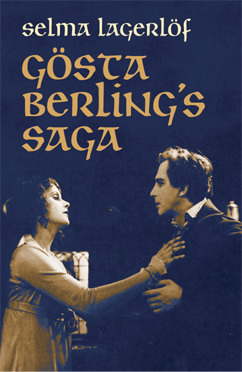I picked up Gösta Berling's Saga in 2008 at the very earliest and probably 2010 at the latest, so this one definitely counts. Good ol' Dover Thrift Editions!
Protip for non-Swedes: you pronounce Gösta something like "Yus-duh."
The only downside is that this edition is a translation from 1894 (with a few chapters being a little later, 1918); there have since been two subsequent translations, one in the 1960s and another in 2009. I don't know if it's entirely the age of the translations that sometimes make this a hard slog so much as the age of the work. (JV had to read it for Swedish class and had a rough time with the old-timey Swedish, so.) Outside the language, there are other challenges: there's a huge cast of characters and the structure is more episodic than purely narrative so chapters can feel clunky and disconnected compared to how novels are written today. (I feel like The Wonderful Adventures of Nils holds together a little better, even if it has a similar episodic structure.)
Still, once you get into it, it's still worth reading over 100 years later. Unsurprisingly for a very feminist and pro-woman, pro-women's rights author, there are a lot of women in this large cast of characters, well developed beyond witches, damsels, and bimbos. They do some awful things, and they also do some heroic things. Of course, most of these women have a tendency to fall in love with Gösta, but then again, he's the hero.
The nutshell is that Gösta Berling, a disgraced whiskey priest, is given shelter at the prosperous Samzelius farmstead. The properties are owned by Major Samzelius but they're run and administered by his wife, Margarita, who enjoys an immense amount of respect and power in the village because she's just so damn good at running things. But an altercation at a Christmas dinner sets in motion a chain of events that leads to Margarita Samzelius being outcast from her home, and the maintenance of her property being turned over for a year to the "cavaliers"—twelve vagabonds she let stay at her property, free of charge, of whom Gösta is the unofficial leader. For the next year, Gösta and the cavaliers drink and carouse and go on adventures and generally run things into the ground. A fitting Christmas read, since it begins and ends on Christmas!
Lagerlöf would later go on to be the first woman to win the Nobel Prize, awarded to her in 1909 "in appreciation of the lofty idealism, vivid imagination and spiritual perception that characterize her writings." And you can see a lot of that in Gösta Berling's Saga, which is in large part taken from the folk and fairy tales Lagerlöf heard growing up in Värmland.
The silent movie version (from which the image for that above book cover is taken) is also notable for kickstarting the film career of no less an international star than Greta Garbo.
 |
| "I want to be alone." No, not quite yet. |
My personal favorite is the ostensible antagonist, Fru Samzelius. While she spends much of the book outcast from her farm and home, pitted against the cavaliers, she begins and ends the story with competence and dignity, and always does things on her own terms.
Another one of my favorite Swedish books, Dr Glas, from around the same time period, has seen a modern re-imagining from the perspective of the antagonist, Reverend Gregorious. I want someone to do the same for Margarita Samzelius. She deserves her own book even more than Reverend Gregorious does. (Behold, the closest I'll ever get to fanfiction!)
Another one of my favorite Swedish books, Dr Glas, from around the same time period, has seen a modern re-imagining from the perspective of the antagonist, Reverend Gregorious. I want someone to do the same for Margarita Samzelius. She deserves her own book even more than Reverend Gregorious does. (Behold, the closest I'll ever get to fanfiction!)
 |
| Gerda Lundqvist, another stage and screen legend, as Fru Samzelius. |
The first line is one of the most recognizable in Swedish literature: "Äntligen stod prästen i predikstolen." It's like the Swedish equivalent of "Call me Ishmael." It still turns up here and there in places, like in this song by MOVITS!
Something like this just seems ripe for the miniseries pickings, to be honest. The episodic chapters would work just fine as standalone episodes, so the scripts would basically write themselves. Come on, Netflix! Otherwise, if you want to dip your toes into classic Swedish literature, I would suggest one of the newer translations, just for accessibility's sake.


No comments:
Post a Comment